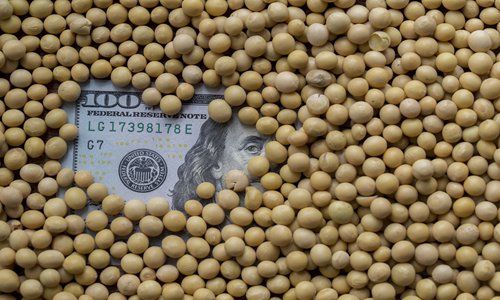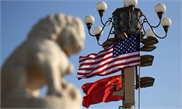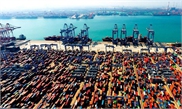
File photo: soybean is a commodity China imports in large quantities from the US. Photo: VCG
Removing tariffs on Chinese products, which could save billions of dollars for US companies and households, could be a fast and efficient help to US industries and the economy amid rising COVID-19 cases in the country, analysts said, adding the US should adopt the measure as soon as possible - instead of playing the China card to divert Americans' attention from its inability to contain the virus.
Analysts also urged the US to prioritize the COVID-19 fight instead of playing gimmicks to cripple China's growth, adding that US tariffs have not and will not curb the growth of the Chinese economy, while they have hampered its ability to fight the virus and could cause potential collapse of many US firms troubled by tariff burden.
"A removal of China tariffs could be more helpful for US economy than the Federal Reserve's move of cutting its benchmark interest rate to zero, since the move will save a large amount of money for US companies," Gao Lingyun, an expert at the Chinese Academy of Social Sciences in Beijing, told the Global Times on Tuesday.
Chinese exporters share about 40 percent of the tariffs the US imposed on Chinese products on average, while the US side bears the larger share of 60 percent, Gao disclosed, citing an unpublished research, noting that it's the US side that would benefit more if it removed the tariffs.
For many daily necessities whose costs are relatively low, it's the US side that bears all the tariffs.
"For products with the cost of only one dollar, we will not bear the tariff anyway. It has been the US importers that bore the tariff over the past months," Yu Zhengdong, an exporter in Yiwu, Zhejiang Province, told the Global Times on Tuesday, adding that a tariff cut will relieve many burdens of American firms.
Yu's company mainly exports textile cleaning products to the US, which account for 70 percent of the company's market share, while due to the trade war, exports to the US slumped by about 90 percent over the past year. The domestic market has become one of Yu's major markets now.
Over the past 20 months, the tariffs on Chinese goods cost US importers $48.1 billion, according to a Reuters report, citing US official data. The US still imposes tariffs of up to 25 percent on some $370 billion worth of Chinese goods.
Some believed China will gain an advantage from the tariff cut, and grab a larger share in the global market. Chinese traders refuted that with more than a year of the China-US trade war, they have expanded into other parts of the world and whether the US decides to lift tariffs or not will not pose a major influence to their businesses.
"The US tariffs have forced us to explore more overseas markets over the past year, for instance, countries along the Belt and Road routes," a Yiwu-based toy trader surnamed Zhang told the Global Times on Tuesday.
Zhang said a removal of tariffs may bring some US orders, but the US market is not a priority now due to uncertainties between the world's two largest economies. "For most industries like us, the removal of US tariffs means nothing during the epidemic - we are looking forward to a rebound of global demand after the virus dies."
"Orders from many markets such as Europe and South Korea, which we explored as a replacement to US market over the past year, are delayed or cancelled due to the virus, causing a 50 percent drop of our revenue," Zhang said.
Moreover, US tariffs on Chinese products are impeding its ability to fight the coronavirus - "as tariffs on Chinese medical products have forced China to divert the sales of these products from the US to other markets, leading to a shortage of such products in the US," a report published by the Peterson Institute showed.
Although US has already announced several targeted exclusions from its tariffs for specific health and medical products over the last week, including surgical drapes, surgical gowns, and hand sanitizer, analysts said the move is already too late.
"Most of the daily necessities made in China are the best buys, and people could hardly find replacements in the world, and the US should eliminate more products from the tariff list before it's too late," Zhang said.



